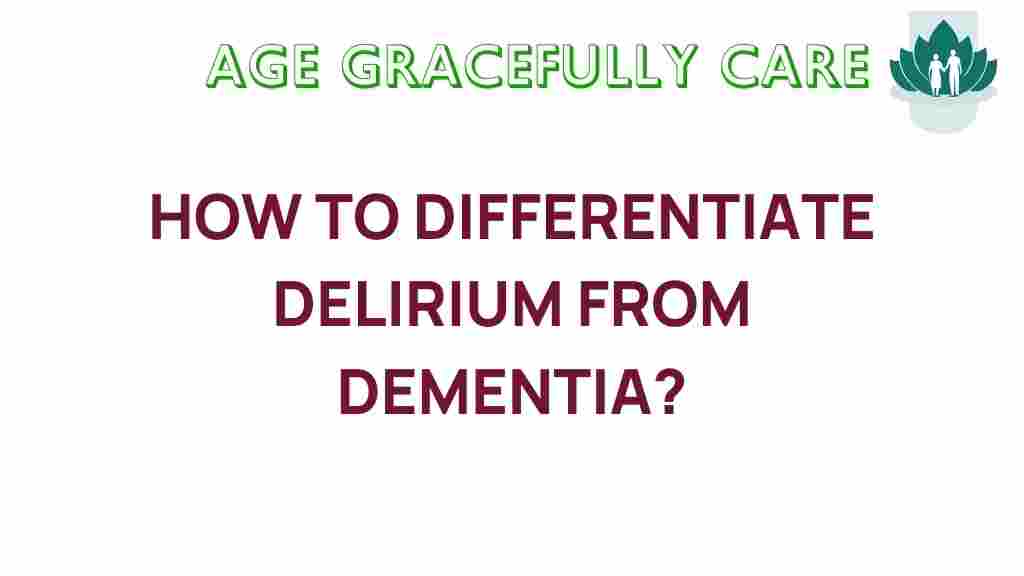Unraveling the Mystery: How to Differentiate Delirium from Dementia
As we age, mental health becomes an increasingly vital aspect of our overall well-being. Among the elderly, two conditions often cause concern: delirium and dementia. Both can lead to significant cognitive decline, but they are distinct in their nature, symptoms, and treatment. Understanding the differences between these two conditions is crucial for effective elderly care and timely healthcare interventions. This article will delve into the characteristics, diagnosis, and treatment options for both delirium and dementia, helping you unravel the mystery surrounding these cognitive disorders.
Understanding Delirium and Dementia
Before we dive deeper, it’s essential to define what delirium and dementia are. Both conditions can affect cognitive function but differ significantly in their causes and manifestations.
What is Delirium?
Delirium is a sudden onset of confusion and cognitive disturbance, often triggered by an underlying medical condition. It can fluctuate in severity and is typically reversible with appropriate intervention. The symptoms of delirium may include:
- Sudden changes in attention and awareness
- Disorientation or confusion regarding time and place
- Hallucinations or delusions
- Difficulty concentrating or following a conversation
- Sleep disturbances
What is Dementia?
Dementia, on the other hand, is a progressive decline in cognitive function due to damage to the brain cells. It usually develops slowly over time and is characterized by a gradual loss of memory, reasoning, and communication skills. Common symptoms of dementia include:
- Memory loss, particularly recent memories
- Difficulty performing familiar tasks
- Problems with language and communication
- Changes in mood and personality
- Impaired judgment and reasoning
Key Differences Between Delirium and Dementia
While both conditions can lead to cognitive decline, several key differences can help differentiate them:
- Onset: Delirium has a rapid onset, while dementia develops slowly over months or years.
- Duration: Delirium is often temporary and can last from hours to days; dementia is progressive and often permanent.
- Attention: Individuals with delirium commonly exhibit fluctuating levels of attention, whereas those with dementia generally have a consistent level of attention, albeit impaired.
- Awareness: Delirium often includes periods of altered awareness, while awareness remains relatively intact in dementia.
Diagnosing Delirium and Dementia
Proper diagnosis is crucial for effective treatment. Here’s how healthcare professionals typically diagnose these conditions:
Diagnosis of Delirium
Diagnosis of delirium involves a thorough assessment that may include:
- Medical history: Understanding the patient’s medical background and recent changes in health.
- Physical examination: Assessing vital signs and neurological function.
- Cognitive tests: Short cognitive assessments to evaluate attention and awareness.
- Laboratory tests: Blood tests to identify potential causes, such as infections or metabolic imbalances.
Diagnosis of Dementia
Diagnosing dementia is more complex and may involve:
- Cognitive assessments: Detailed tests to evaluate memory, problem-solving, and language skills.
- Neuroimaging: MRI or CT scans to identify brain changes associated with dementia.
- Psychiatric evaluations: Assessing mood and behavior to rule out other mental health disorders.
For more information on mental health assessments, visit MentalHealth.gov.
Treatment Options for Delirium and Dementia
The treatment approaches for delirium and dementia differ significantly due to their distinct natures.
Treatment for Delirium
Delirium is often reversible, so treatment focuses on addressing the underlying cause. Common treatment strategies include:
- Medications: Administering drugs to manage symptoms or treat underlying conditions, such as infections.
- Environmental modifications: Ensuring a calm and safe environment to reduce confusion.
- Supportive care: Providing reassurance and orientation to the individual.
Treatment for Dementia
While there is currently no cure for dementia, treatments can help manage symptoms and improve quality of life. Common approaches include:
- Medications: Certain drugs can help manage symptoms, such as memory loss and agitation.
- Cognitive therapies: Engaging in activities that promote cognitive function, such as puzzles and memory games.
- Support services: Utilizing caregiver support and resources for families.
Step-by-Step Process for Managing Cognitive Decline
Managing cognitive decline in the elderly involves a proactive approach. Here’s a step-by-step process to consider:
Step 1: Recognize Symptoms
Knowing the symptoms of delirium and dementia is the first step. Be observant of sudden changes in behavior or cognition.
Step 2: Consult Healthcare Professionals
If symptoms arise, seek medical advice promptly. Early diagnosis can lead to better outcomes.
Step 3: Undergo Diagnostic Testing
Allow healthcare providers to conduct the necessary tests to determine whether the cognitive decline is due to delirium, dementia, or another condition.
Step 4: Follow Treatment Recommendations
Adhere to the treatment plan provided by healthcare professionals, whether it involves medications, therapies, or lifestyle changes.
Step 5: Monitor Progress Regularly
Regular check-ups with healthcare providers are essential to monitor the condition and adjust treatment plans as needed.
Troubleshooting Tips for Family Caregivers
Family caregivers play a crucial role in managing the care of elderly individuals experiencing cognitive decline. Here are some troubleshooting tips:
- Maintain a routine: Establishing a daily routine can provide structure and reduce confusion.
- Communicate clearly: Use simple language and maintain eye contact to enhance understanding.
- Stay patient: Approach each situation with empathy and patience, understanding that cognitive decline can lead to frustration.
- Seek support: Don’t hesitate to reach out for help from healthcare professionals or support groups.
Conclusion
Understanding the differences between delirium and dementia is vital for effective management of cognitive decline in the elderly. While delirium is often a temporary condition that can be treated by addressing its underlying causes, dementia is a progressive disorder requiring ongoing care and support. By recognizing the symptoms, seeking timely diagnosis, and implementing appropriate treatment strategies, caregivers and healthcare professionals can significantly improve the quality of life for elderly individuals facing these challenges. For more resources on elderly care and mental health, consider exploring NIA.nih.gov for expert guidance.
This article is in the category Health and created by AgeGracefullyCare Team
